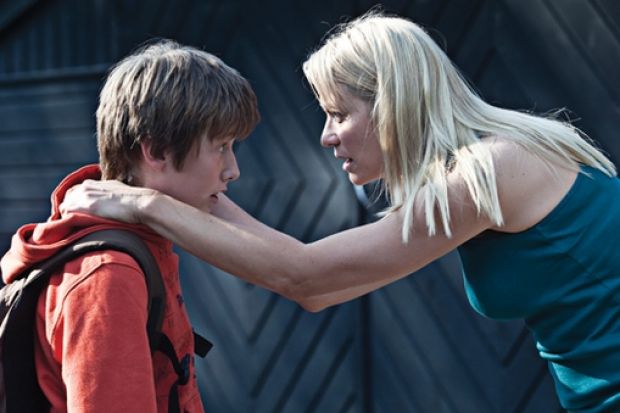In a Better World
Directed by Susanne Bier
Starring Mikael Persbrandt, Trine Dyrholm, Markus Rygaard and William Johnk Nielsen
Released in the UK on 19 August
"Everybody has killed in this place," says an African warlord to an aid worker in Susanne Bier's new film, In a Better World; such is his defence for having murdered a series of pregnant women. What should the aid worker do? Treat the man's gangrenous leg, or allow him to be torn, limb from limb, by his victims' relatives, who await him outside the boundaries of the camp?
That dilemma hints at other questions. The aid worker is Anton (Mikael Persbrandt), who divides his time between Africa and his home in Denmark, where he lives with his sons. He is separated from their mother, Marianne (Trine Dyrholm), who left him after an infidelity. "I've said sorry," he tells her, "and I mean it from the bottom of my heart." "I want to forgive you, but I can't," she replies. In every way, he behaves like a civilised person: when attacked in the street, he turns the other cheek, counselling his sons to do likewise. In his work, he tends to the physical requirements of those in need.
The less agreeable truths of our nature are seen most vividly in the playground. Anton's 10-year-old son, Elias (Markus Rygaard), is the victim of bullying at school. Elias' new friend Christian (William Johnk Nielsen) at first defends him, then encourages Elias to take revenge on his persecutors. As the boys understand it, revenge can only take the form of physical violence.
The film is preoccupied with the question of whether human beings have it within themselves truly to forgive those who trespass against them. Most of its characters are so defensive they cannot do so, consumed with the desire to withhold themselves or to strike back. As Elias and Christian pursue their path of retribution, it becomes clear that they differ hardly at all from the characters in Africa for whom brutality is a way of life. This vision would be potent at any time, but it is all the more so when the West finds itself in the position of imposing various forms of "order" in the Middle East. The line between a just and an unjust war is harder to draw than we would like to claim, and the film would have us scrutinise our belief in the righteousness of our cause.
The theme of In a Better World is the flawed condition of humanity - our tendency to violence, the desire to harm those who have harmed us, and (most potent of all) the damage wrought by loss. Its unflinching gaze makes this a drama of exceptional honesty. This is most persuasively achieved in its portrayal of Elias' schoolfriend Christian who, far from being a "psychopath", as he is described at one point, is in grief for his mother, who died of cancer several months before. "I miss her so much," he tells Elias.
The film is also excellent on the psychology of the bully - on how they surround themselves with lieutenants; on how the victim retreats inward, preferring to keep silent than complain; and on how schools react by treating the victim as if he were the culprit. The result, as it shows, is that the violence generated by bad parenting becomes institutionalised in society at large.
This is a credible, intelligent portrait of modern society; if it has a flaw, it is in requiring that its audience suspend its disbelief on one or two points - for instance (without giving too much away) that a 10-year-old boy might be capable of finding the ingredients necessary to build sophisticated weapons in his father's garage, and of constructing them without anyone noticing. However, the film is redeemed by its cast - all of whom are completely persuasive, especially the children. Indeed, I have not seen child-acting of this order since Let the Right One In (2008), another Scandinavian film also concerned with bullying.
In a Better World is refreshing for its refusal to pretend that human beings are wonderful and that a little love will make everything all right - the philosophy of so many contemporary films, especially from the US. Instead it faces up to the fact that, out of a desire to protect children from some of the darker truths of human existence, it is possible even for loving parents to make mistakes that place their children in harm's way.
Register to continue
Why register?
- Registration is free and only takes a moment
- Once registered, you can read 3 articles a month
- Sign up for our newsletter
Subscribe
Or subscribe for unlimited access to:
- Unlimited access to news, views, insights & reviews
- Digital editions
- Digital access to THE’s university and college rankings analysis
Already registered or a current subscriber? Login
